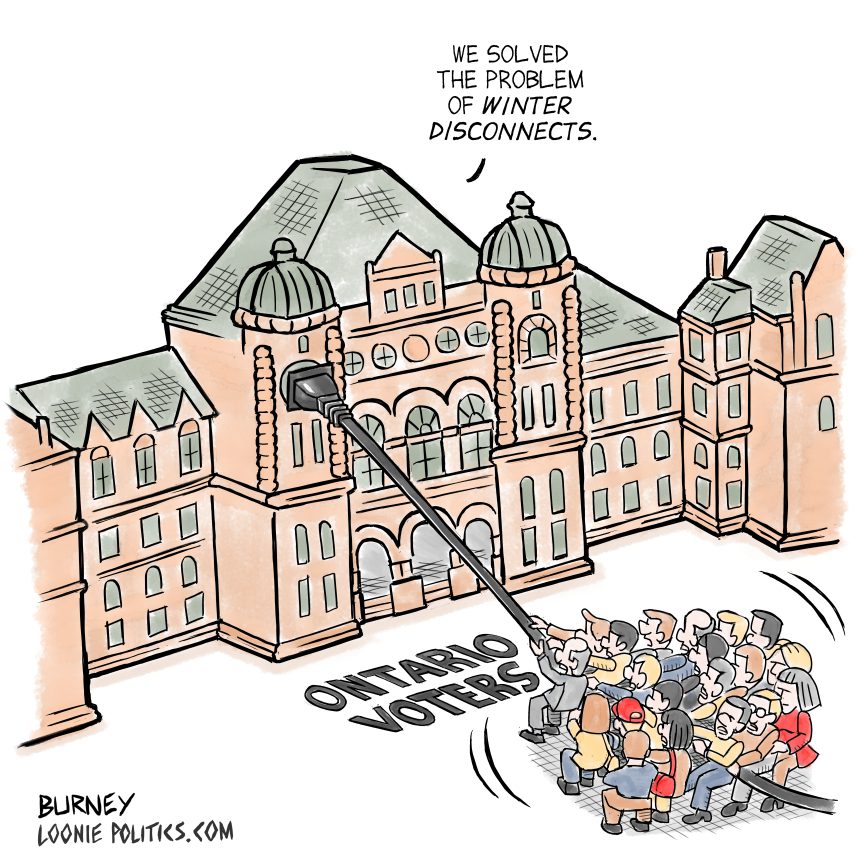Patrick Brown got played, and badly at that.
For his entire tenure as Conservative Opposition Leader in Ontario, the only thing the career politician has been consistent on is that electricity rates are too high, and something must be done about it. He's not wrong, but his blatant use of falsehoods — erroneously claiming Ontario has the highest rates in North America, when we're fairly middle of the pack, falsely attributing the rate increases to renewable energy projects, not the massive system refurbishment needed after brownouts and smog days in the early 2000s — was a particularly cynical brand of politicking.
Brown was happy to exploit justified consumer anger over rate increases — estimates suggest prices shot up by 70% in the past decade — no doubt thinking that rage against Premier Kathleen Wynne alone would be enough to vault him into the Premier's Office. His strategy was great — so long as Premier Wynne played dead and let him walk all over her, for the next fifteen months. But why would anyone bet on that?
Premier Wynne has been the underdog in every race she's ever ran. And yet she stands as the Premier of Canada's largest province with a majority government. She is not to be underestimated. But that is exactly what Patrick Brown did.
Did the Ontario Conservatives seriously expect the Liberals would take consumer rage on the chin for two years, and not offer a plan to mitigate the anger? If Tories did, boy were they ever wrong.
This week, Premier Wynne unveiled a plan to cut electricity rates by 25% by rejigging the financial repayment system to pay less upfront over a longer term for infrastructure projects, and a tax cut on the provincial portion of the HST. It's estimated to save the average consumer north of $300 per year. Liberals are touting it as the largest reduction to hydro rates in history; I wish we'd also tout that it's the largest tax cut in twenty years, too.
How did Brown and his crew not see this coming? Liberals have been telegraphing that they'd do something about hydro rates for months now. And yet, there's a clip or two making the rounds on social media of an utterly befuddled, goateed Tory MPP doing his usual routine criticising the government about electricity rates, and then repeatedly laughing awkwardly, stammering and barely able to find his feet on what should have been an obvious follow-up question: "OK, so what's your plan?" The clips are an utter train wreck, and happened at least twice. The best the MPP can offer is "we might have a plan…by November"—that's pathetic. Again, how did the Conservatives not see this coming?
There's fair criticisms to be raised about Wynne's plan to reduce bills. It benefits the poor and the superrich equally, for one. But for a Conservative, it's hard to oppose a tax cut (hence why I think a greater focus on "the largest tax cut in twenty years" has merit). So the galaxy of rightwing voices online has seized on the theme that essentially "remortgaging" the payments for infrastructure is fiscally irresponsible. There's an argument to be made on either side of this debate. But I suspect Ontario Liberals are just fine to have an argument over whether their plan to reduce rates by 25% is flawless, when the obvious counterattack is "OK, so where's your plan, buddy?"
Brown's let himself get boxed in here. He can't oppose a tax cut, especially when he's already taking grief from his base over his flip-flops (plural) on pollution pricing (he now says he favours a direct carbon tax). And while he can argue that drawing out the repayment period to lower rates now is not a flawless strategy, that only takes you so far.
His only remaining play might be to try to renegotiate some contracts. But that's an inherently risky strategy; as we saw with the gas-plant cancellations, contracts have penalties built in to protect the contractors. Ontario voters will be wary of someone promising to rip up energy contracts, and for good reason. Plus, there's already evidence the Liberal government plans to do what it can to better scrutinise contracts going forward, and aims to enact broader system changes as well. If all Brown has left is to make some vague commitments to be a tougher negotiator, he'll not really be able to "one up" the Liberal plan on the plane that matters — dollars and cents saved.
He's not left himself with much to go on, especially once ratepayers see their bills go from $140 per month down to $100 this summer. Anger will dissipate as ratepayers see relief arriving in the mail every month. At least that's the Liberal hope, and it seems a reasonable one. At the very least, Wynne can say in the 2018 campaign, "I took action. I saved you around $400 over the past fifteen months. The other guy doesn't have a clue."
In February, the Ontario NDP rushed out a half-baked pledge to lower rates between 17%-30%, knowing that the government was going to do something. Their plan was mostly a plan to have a plan, and to ask the Trudeau government to help out. It was pretty laughable pablum, reminiscent of Donald Trump's secret plan to fight ISIS — by asking the generals to make him a plan to fight ISIS. But at least the NDP tried to get out ahead of the government. They at least have some bragging rights for moving early, even if the government ultimately outfoxed them.
Yet Brown's let himself be utterly out-manoeuvred. It's political malpractice, really. As Trump would say, "Sad!"






